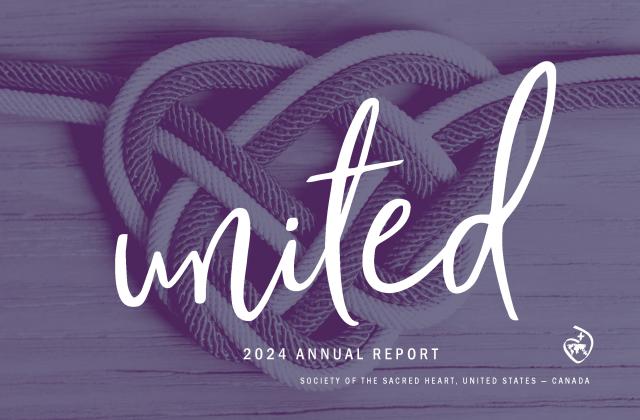Betsy Hartson, RSCJ Class of 1955 is a living model of many of the values upon which the Religious of the Sacred Heart were founded. Hartson has been involved in educating for over 25 years in Sacred Heart schools, but she has applied the educational mission to her efforts outside of the Society’s schools as well. Currently, and for the past 12 years, Hartson has been the Program Director of an adult education program called Living Wages.
After moving to Washington D.C. to better address the needs of the homeless, Hartson and some of her co-workers at Catholic Charities discovered that something was missing in their efforts—education.
“We started [Living Wages] after working with the homeless,” Hartson explained. “Without education we’re just recycling people through the system.”
Sr. Hartson, together with co-worker Robert Crittenden, and three other Catholic Charities staff members founded Living Wages in 1999 with the help of a government grant. The non-profit organization assists adults in working toward various learning goals by teaching both skills and values. The foundation of the organization centers on the idea that all adults have the right and should be given the opportunity to earn a living wage—a salary that provides beyond the bare necessities.
Living Wages is much more than simply classes or seminars. According to their website (livingwages.org), “Our mission is to prepare participants to become lifelong learners, to compete successfully in the job market, to become competent parents and family members, and to exercise their rights and responsibilities as citizens through active community involvement.” The non-profit is fundamentally about community. Volunteers, employees, and students work together toward goals such as the GED, External Diploma Program, or improving basic skills. The organization places much weight on the External Diploma Program, wherein adult learners demonstrate 65 practical skills in lieu of passing standardized tests. They also offer the ability for students and volunteers to help cultivate a garden and enroll in seminars.
Hartson credits many of her ideas about education to her own instruction at The Rosary.
“I think I got so much from Sacred Heart,” Sister Hartson said. “Without the prayer, contemplation, service, social justice, I wouldn’t be where I am today.”
Sister Hartson believes that her religious education helped plant in her the desire to help the marginalized. She felt that her teachers encouraged her to “reach out to the poor who were not living the way we were.”
Through the Society of the Sacred Heart, she gained opportunities to enact change. “Most RSCJs go about their lives thinking, ‘What are the needs out there?’” Sister Hartson said. Each year she works with 150 to 200 students through Living Wages. Together with her co-workers, the organization is making strides in reforming the way society looks at education by highlighting the advantage of popular education. In contrast to formal education, popular education centers on teachers and learners working together to help adults take control of their own learning.
“Popular education is about the people and being empowered,” Hartson said. “And it’s working.”
Many learners advance one or more grade levels in their education. This July, Hartson watched 40 men and women receive diplomas from Living Wages. Other learners have gone on to advance in their workplaces, and many return to Living Wages to volunteer.
“It’s not about numbers,” she explained. “It’s not about competition; it’s about the person.”
Hartson feels that her work through Living Wages communicates deeply with the foundation of the Society of the Sacred Heart. As St. Madeleine Sophie Barat said, “For the sake of one child, I would have founded the Society.” Living Wages is run in a similar way, by focusing on each individual and what they can achieve.
“Everybody is gifted. Everyone has something to give,” she said. “When we don’t educate them, the whole society is losing out.”
Article printed with permission from Academy of the Sacred Heart - New Orleans.



